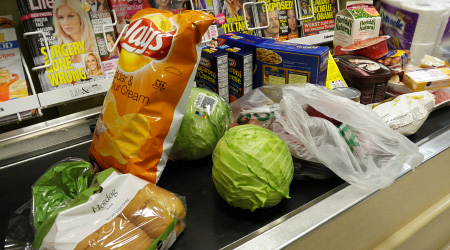12 Tasty Tips to Save on Food

The average family spends between 10% and 15% of their annual budget on food related expenses. This same family also carries on average about $8,000 in credit card debt. By saving money on food, most households can benefit from putting less expenses on credit cards while eating healthier and getting more food in the process. Below are some the top tips to save money on food by being smart and planning ahead.
1. Buy Store Brands
There is often little difference between store brands and name brands when it comes to overall quality especially on generics like milk, sugar and bread. The days of white boxes with black letters and low-quality are long in the past.
2. Make Shopping Lists
Aimlessly wandering around the grocery store picking up whatever strikes your fancy is a great way to waste money. Being prepared by planning meals ahead of time and then purchasing food accordingly minimizes wasteful spending.
3. Use Coupons
Coupons can be found in weekly flyers as well as online and can be used to purchase name brand products at lower total costs. Television shows and Internet websites are dedicated to getting the most out of clipping and organizing coupons which can result in 30% to 50% savings on some items.
4. Buy In Bulk
Some items are perfect for buying in bulk like toiletries and paper products as well as nonperishable items like canned goods and grain based food items. If your family is constantly eating rice or goes through a lot of paper towels, you can save a lot of money by buying in bulk at a membership club.
5. Cook Too Much
Depending on how you and your family feel about leftovers, cooking too much can be a great way to incorporate seasonal purchases and buying in bulk. When making meals, prepare the maximum servings the recipe calls for and store excess portions in freezer bags or containers.
6. Grow Your Food
Nothing tastes better than fresh produce and it feels good to grow your own. Personal and community gardens have increased in popularity and many fruits and vegetables can be grown inexpensively providing a readily available source of healthy food for you and your family.
7. Eat Healthy
Eating healthy not only has the benefit of making you feel better which results in losing weight and having more energy but it can also save you money. Ironically, the least healthy stuff at a grocery store also tends to be the most expensive. Fruits and vegetables with rice and potatoes tend to be the least costly so stick with the staples.
8. Never Buy Water
Paying for bottled water has become the most ridiculous scam in the history of retail sales. Municipal water supplies are regulated by the government and guaranteed to be free from harmful pollutants and chemicals. If you don't like the taste then buy a water filter system for your refrigerator or sink.
9. Shop Seasonally
Farmers markets have taken off in recent years as a way to shop locally supporting small business but has the added benefit of low-cost produce. Sweetcorn, apples and other fruits and vegetables offer lower prices when in season.
10. Prepare To Save
Paying for cutup watermelon and grated cheese is an expensive convenience that most consumers can do themselves. Consumers physical limitations which prevent preparation are the exception and not the rule. Stop paying 300% to 400% markups simply because someone took a few minutes to cut your fruit for you.
11. Don't Shop Hungry
It's hard to stick to a grocery list and buy only what you need when walking down the aisle starving of hunger. Only go shopping when well fed to ensure your stomach doesn't make the decisions for your brain.
12. Always Shop Alone
As any parent knows taking the kids grocery shopping can easily add 10% to 20% to your grocery bill. Even spouses are known to grab things off the shelves and put them in the shopping cart even though they shouldn't. If you want to stick to a budget and grocery list be sure to shop alone if at all possible.







